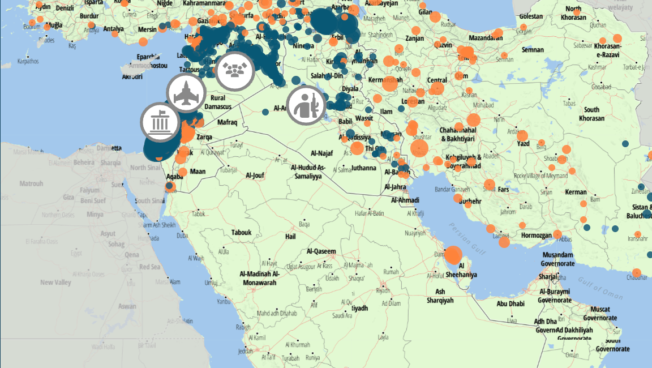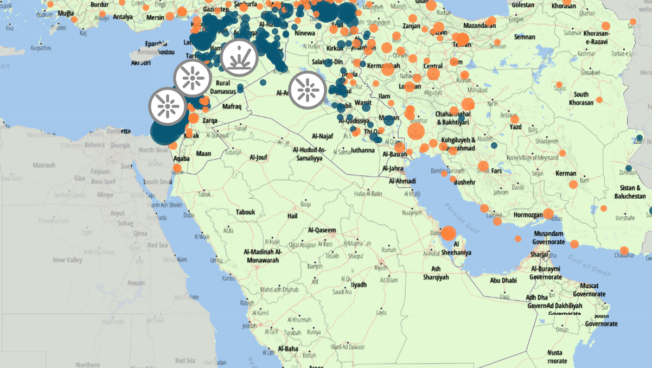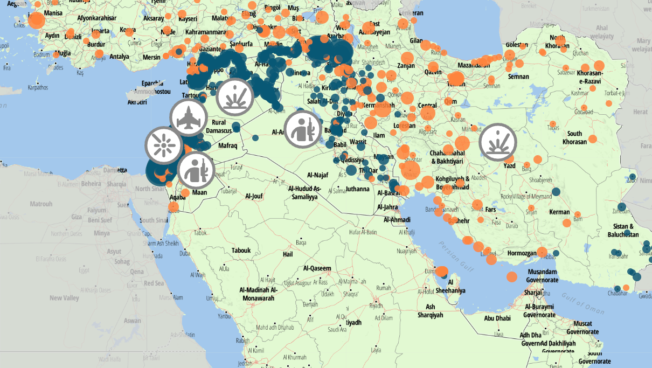Regional Overview
Middle East
March 2023
Posted: 6 April 2023
 Iran and Saudi Arabia: Landmark agreement reached on resumption of diplomatic ties
Iran and Saudi Arabia: Landmark agreement reached on resumption of diplomatic ties
On 10 March, Iran and Saudi Arabia announced an agreement to resume diplomatic relations and reopen embassies within two months, in a landmark deal mediated by China.1Parisa Hafezi, Nayera Abdallah and Aziz El Yaakoubi, ‘Iran and Saudi Arabia agree to resume ties in talks brokered by China,’ Reuters, 10 March 2023 Saudi Arabia cut diplomatic ties with Iran in early 2016 in response to the storming of its embassy in Tehran by hard-line elements following the execution of a Shiite cleric by Saudi authorities. The two regional rivals have long been at odds and supporting opposite sides in the region for decades, including in Yemen, Syria, Iraq, and Lebanon. The rapprochement between the two countries will likely have strong repercussions for the region, including the potential resolution of regional elements of the Yemeni civil war and accelerating Syria’s re-integration into the Arab world’s diplomatic fold.
 Yemen: Violence surges in Marib governorate despite regional diplomatic breakthroughs
Yemen: Violence surges in Marib governorate despite regional diplomatic breakthroughs
Battle events between Houthi and anti-Houthi forces in Marib increased threefold in March compared to the month prior, reaching the highest level since May 2022. The escalation in hostilities led to the first significant change in frontlines between Houthi and anti-Houthi forces in Yemen since the implementation of the United Nations-mediated truce in April 2022, and is likely an attempt by Houthis to gain leverage in ongoing political negotiations. The violence comes despite the resumption of diplomatic ties between Iran and Saudi Arabia and negotiations between Houthi de facto authorities and the Internationally Recognized Government (IRG) on conflict-related detainees in March, which have raised hopes for bringing the conflict to an end.2Edith Lederer, ‘UN says intense diplomacy under way to end 8-year Yemen war,’ Associated Press, 16 March 2023 Following the Houthis’ ouster of the Yemeni government in 2014, the country spiraled into a civil war, which also became the scene and proxy for a protracted Iran-Saudi Arabia conflict.
 Syria: Escalation in hostilities between US forces and pro-Iran militias
Syria: Escalation in hostilities between US forces and pro-Iran militias
Mutual shelling and drone attacks between pro-Iran militias and US military forces alongside the Global Coalition Against Daesh increased significantly in the second half of March. Hostilities were triggered when the al-Ghalibun Brigade, a militia affiliated with Iran’s Islamic Revolutionary Guard Corps (IRGC), launched a drone attack against a US military base in the Rmelan area in al-Hasaka province, reportedly killing one US contractor. In response to the attack, US forces conducted several drone strikes against IRGC, pro-Iran militias, Hizbullah, and regime positions in Dayr al-Zur province, reportedly killing 16 pro-Iran and regime fighters. This, in turn, led to more shelling attacks by pro-Iran militias on Global Coalition Against Daesh and US military bases in al-Hasaka and Deyr al-Zur provinces. US forces, the Global Coalition Against Daesh, and pro-Iran militias have been engaged in sporadic mutual shelling and airstrikes since 2019.
 Israel: Netanyahu delays judicial reforms after mass demonstrations
Israel: Netanyahu delays judicial reforms after mass demonstrations
In Israel, demonstrations and strikes over the contentious judicial reform legislation further intensified in March as the Israeli parliament passed the first of several laws limiting the courts’ abilities to declare a sitting prime minister unfit for office. Mass demonstrations erupted in over 35 distinct locations across the country after Prime Minister Benjamin Netanyahu fired Defense Minister Yoav Gallant on 26 March over his opposition to the move, and the Israel’s largest trade union launched a historic strike on 27 March. On the day of the strike, Netanyahu announced a temporary freeze on the legislation until the next parliamentary session.3Al Jazeera, ‘Israel PM Netanyahu delays judicial overhaul after protests, 27 March 2023 Gallant had warned that the judicial overhaul was a threat to national security after hundreds of intelligence and military special forces reservists halted their volunteer service, threatening not to report for training in protest against the planned judicial changes.4Dan Arbell, ‘Israel’s military reservists are joining protests – potentially transforming a political crisis into a security crisis,’ The Conversation, 28 March 2023 Despite the deferment, internal turmoil is expected to persist as Netanyahu and his right-wing government continue to insist that the overhaul is necessary.
 Palestine: Political violence remains at heightened levels in the West Bank
Palestine: Political violence remains at heightened levels in the West Bank
The violence in Palestine’s West Bank remained at heightened levels in March, similar to the month prior. The Israeli forces reportedly killed over 20 Palestinian rioters and militants during arrest raids in the West Bank, including the commander of the newly formed Katibat Tulkarm – Quick Response armed group on 23 March. At the same time, Palestinians continued their attacks on Israeli military forces and settlers in the West Bank. On 19 March, a Palestinian gunman affiliated with the Popular Front for the Liberation of Palestine wounded two Israeli settlers, one of whom also had US citizenship, in Huwara. The village also continued to be the scene of violent rampages by settlers, who have been attacking Palestinians and their properties since late February when militants killed two Israelis. Despite the ongoing violence, fears that an already-violent year could significantly escalate during the Muslim holy month of Ramadan have yet to materialize. Concerns remain, though, that the overlap of Ramadan and the Jewish holiday of Passover in April – when more visitors are drawn to the Old City – may lead to worsening tensions in Jerusalem.
 Iraq: New electoral law triggers demonstrations
Iraq: New electoral law triggers demonstrations
On 27 March, the Iraqi parliament passed a controversial election law that rolled back many changes implemented after the 2019 October protest movement.5Al Jazeera, ‘Iraqi parliament passes controversial vote law amendments,’ 27 March 2023 Demonstrations opposing the law began in late February, but escalated in early March and again during the days before and after the law’s adoption. About half of these demonstrations took place in Thi Qar province, the epicenter of the 2019 movement, during which Iraqi security forces and Iran-backed militias violently cracked down on demonstrators, reportedly killing hundreds (for more, see Iraq’s October Revolution: Six Months On). Major cities, including Baghdad, also witnessed demonstrations. The new law rolls back key demands of the 2019 protest movement by dividing provinces into multiple electoral districts and re-instituting provincial councils. Independent members of the parliament also criticized the new law for implementing the Sainte-Lague vote-counting method, which they claim will support larger electoral blocs at the expense of smaller parties.6Shafaq, ‘Independent lawmakers in Iraq reject current electoral law, political blocs unwilling to negotiate,’ 25 March 2023 The Iran-aligned Shiite Coordination Framework bloc – which lost seats in the 2021 elections – was among the key architects of the new law.7Asia News, ‘Iraq gets a new electoral law backed by pro-Iranian Shia bloc,’ 28 March 2023
إيران والمملكة العربية السعودية: التوصل إلى اتفاق تاريخي بشأن استئناف العلاقات الدبلوماسية
أعلنت إيران والمملكة العربية السعودية في 10 مارس/آذار عن اتفاق لاستئناف العلاقات الدبلوماسية وإعادة فتح السفارات في غضون شهرين، في اتفاق تاريخي بوساطة صينية.[1] وقد قطعت المملكة العربية السعودية العلاقات الدبلوماسية مع إيران في أوائل عام 2016 رداً على اقتحام عناصر متشددة لسفارتها في طهران بعد إعدام السلطات السعودية لرجل دين شيعي. ولطالما كان الخصمان الإقليميان على خلاف ويدعمان أطرافاً متعارضة في المنطقة منذ عقود، بما في ذلك في اليمن، وسوريا، والعراق، ولبنان. ومن المرجح أن يكون للتقارب بين البلدين تداعيات قوية على المنطقة، بما في ذلك الحل المحتمل للتداعيات الإقليمية للحرب الأهلية اليمنية وتسريع إعادة اندماج سوريا في الحظيرة الدبلوماسية للعالم العربي.
اليمن: تصاعد العنف في محافظة مأرب على الرغم من الإنجازات الدبلوماسية الإقليمية
زادت أحداث المعارك بين الحوثيين والقوات المناهضة لهم في مديرية مأرب ثلاثة أضعاف في شهر مارس/آذار مقارنةً بالشهر السابق، لتبلغ أعلى مستوى لها منذ مايو/أيار 2022. وقد أدى التصعيد في الأعمال العدائية إلى أول تغيير كبير في الخطوط الأمامية بين الحوثيين والقوات المناهضة لهم في اليمن منذ تنفيذ الهدنة التي توسطت فيها الأمم المتحدة في أبريل/نيسان 2022، ومن المرجح أن يكون هذا محاولة من جانب الحوثيين لكسب النفوذ في المفاوضات السياسية الجارية. وتأني أعمال العنف على الرغم من استئناف العلاقات الدبلوماسية بين إيران والمملكة العربية السعودية والمفاوضات بين سلطات الأمر الواقع الحوثية والحكومة المعترف بها دولياً بشأن المحتجزين لأسباب تتعلق بالنزاع في مارس/آذار، مما أثار الآمال في إنهاء النزاع.[2] وقد دخلت اليمن في دوامة الحرب الأهلية في أعقاب إطاحة الحوثيين بالحكومة اليمنية عام 2014، كما أصبحت البلاد مسرحاً ووكيلاً للنزاع المطول بين إيران والمملكة العربية السعودية.
سوريا: تصاعد الأعمال العدائية بين القوات الأمريكية والميليشيات الموالية لإيران
ازداد القصف المتبادل وهجمات الطائرات المسيرة بين الميليشيات الموالية لإيران والقوات العسكرية الأمريكية إلى جانب التحالف الدولي ضد داعش بشكل كبير في النصف الثاني من شهر مارس/آذار. واندلعت الأعمال العدائية عندما شن لواء الغالبون، وهو ميليشيا تابعة للحرس الثوري الإيراني، هجوماً بالطائرات المسيرة على قاعدة عسكرية أمريكية في منطقة رميلان بمحافظة الحسكة، مما أسفر عن مقتل متعاقد أمريكي، حسب ما أفادت به التقارير. ورداً على الهجوم، شنت القوات الأمريكية عدة غارات جوية بطائرات بدون طيار ضد الحرس الثوري الإيراني، والميليشيات الموالية لإيران، وحزب الله، ومواقع النظام في محافظة دير الزور، مما أسفر عن مقتل 16 مقاتلاً موالين لإيران والنظام. وأدى ذلك بدوره إلى المزيد من هجمات القصف التي شنتها الميليشيات الموالية لإيران على التحالف الدولي ضد داعش والقواعد العسكرية الأمريكية في محافظتي الحسكة ودير الزور. وقد شاركت القوات الأمريكية، والتحالف الدولي ضد داعش والميليشيات الموالية لإيران في قصف متبادل وغارات جوية متقطعة منذ عام 2019.
إسرائيل: نتنياهو يؤجل الإصلاحات القضائية بعد مظاهرات حاشدة
اشتدت حدة المظاهرات والإضرابات في إسرائيل بسبب تشريعات الإصلاح القضائي المثيرة للجدل في شهر مارس/آذار عندما أقر البرلمان الإسرائيلي أول قانون من بين عدة قوانين تحد من قدرة المحاكم على إعلان عدم أهلية رئيس الوزراء للمنصب الذي يشغله. واندلعت مظاهرات حاشدة في أكثر من 35 موقعاً مختلفاً في جميع أنحاء البلاد بعد أن أقال رئيس الوزراء بنيامين نتنياهو وزير الدفاع يوآف غالانت في 26 مارس/آذار بسبب معارضته لهذه الخطوة، ونفذت أكبر نقابة عمالية في إسرائيل إضراباً تاريخياً في 27 مارس/آذار. وفي يوم الإضراب، أعلن نتنياهو عن تجميد مؤقت للتشريعات حتى الجلسة البرلمانية المقبلة.[3] وقد حذر غالانت من أن هذا الإصلاح القضائي يمثل تهديداً للأمن القومي بعد أن أوقف مئات من جنود الاحتياط في المخابرات والقوات الخاصة العسكرية خدمتهم التطوعية، وهددوا بعدم حضور التدريبات احتجاجاً على التغييرات القضائية المزمعة.[4] ورداً على الفوضى المتفاقمة، أعلن نتنياهو عن تجميد مؤقت للتشريع حتى الجلسة البرلمانية المقبلة. وعلى الرغم من التأجيل، فمن المتوقع أن تستمر الاضطرابات الداخلية مع استمرار نتنياهو وحكومته اليمينية في الإصرار على أن الإصلاح ضروري.
فلسطين: لا يزال العنف السياسي عند مستويات مرتفعة في الضفة الغربية
ظل العنف في الضفة الغربية الفلسطينية عند مستويات مرتفعة في مارس/آذار، على غرار الشهر السابق. فقد أفادت التقارير بأن القوات الإسرائيلية قتلت ما يزيد عن 20 شخصاً من مثيري الشغب والمسلحين الفلسطينيين خلال مداهمات اعتقال في الضفة الغربية، بما في ذلك قائد مجموعة الرد السريع المسلحة ”كتيبة طولكرم“ التي تشكلت حديثاً في 23 مارس/آذار. وفي الوقت نفسه، واصل الفلسطينيون هجماتهم على القوات العسكرية الإسرائيلية والمستوطنين في الضفة الغربية. وفي 19 مارس/آذار، أصاب مسلح فلسطيني تابع للجبهة الشعبية لتحرير فلسطين مستوطنين إسرائيليين، أحدهما يحمل الجنسية الأمريكية أيضاً، في حوارة. ولا تزال القرية أيضاً مسرحاً لهجمات عنيفة من جانب المستوطنين، الذين يهاجمون الفلسطينيين وممتلكاتهم منذ أواخر فبراير/شباط عندما قتل مسلحون اثنين من الإسرائيليين. وعلى الرغم من العنف المستمر، فإن المخاوف من تصاعد أعمال العنف في عام مليء بالعنف بالفعل خلال شهر رمضان لم تتبلور بعد. لكن لا تزال هناك مخاوف من أن يؤدي تداخل شهر رمضان وعيد الفصح اليهودي في أبريل/نيسان – عندما يحضر المزيد من الزوار إلى البلدة القديمة – إلى تفاقم التوترات في القدس.
العراق: القانون الانتخابي الجديد يشعل المظاهرات
أقر البرلمان العراقي، في 27 مارس/آذار، قانون الانتخابات المثير للجدل الذي ألغى العديد من التغييرات التي تم تنفيذها بعد حركة الاحتجاج التي شهدتها البلاد في أكتوبر/تشرين الأول 2019.[5] وقد بدأت المظاهرات المناهضة للقانون في أواخر شهر فبراير/شباط، لكنها تصاعدت في أوائل مارس/آذار ومرة أخرى خلال الأيام التي سبقت إقرار القانون وتبعته. ووقع ما يقرب من نصف هذه المظاهرات في محافظة ذي قار، مركز حركة عام 2019، التي قمعت خلالها قوات الأمن العراقية والميليشيات المدعومة من إيران المتظاهرين بعنف، مما أدى إلى مقتل المئات (للمزيد، انظر ثورة تشرين العراقية: بعد ستة أشهر). كما شهدت المدن الكبرى مظاهرات، بما فيها بغداد. ويتراجع القانون الجديد عن المطالب الرئيسية لحركة الاحتجاج التي شهدها عام 2019 بتقسيم المحافظات إلى عدة دوائر انتخابية وإعادة تأسيس مجالس المحافظات. وانتقد أعضاء مستقلون في البرلمان القانون الجديد أيضاً لتطبيقه طريقة سانت ليغو لفرز الأصوات، التي يزعمون أنها ستدعم الكتل الانتخابية الأكبر على حساب الأحزاب الصغيرة.[6] وقد كانت كتلة الإطار التنسيقي الشيعي المتحالفة مع إيران، والتي خسرت مقاعدها في انتخابات عام 2021، من بين المهندسين الرئيسيين للقانون الجديد.[7]
[1] باريسا حافظي، ونيرة عبد الله، وعزيز اليعقوبي، ”إيران والسعودية تتفقان على استئناف العلاقات في المحادثات التي جرت بينهما بوساطة صينية“، رويترز، 10 مارس/آذار 2023
[2] إديث ليديرير، ”الأمم المتحدة تقول إن هناك دبلوماسية مكثفة جارية لإنهاء حرب اليمن المستمرة منذ 8 سنوات“، أسوسياتد برس، 16 مارس/آذار2023
[3] الجزيرة، ”رئيس الوزراء الإسرائيلي نتنياهو يؤجل الإصلاح القضائي بعد اندلاع الاحتجاجات“، 27 مارس/آذار 2023
[4] دان أربيل، ”جنود الاحتياط العسكريون الإسرائيليون ينضمون إلى الاحتجاجات – مما قد يحول الأزمة السياسية إلى أزمة أمنية“، ذا كونفرزيشن، 28 مارس/آذار 2023
[5] الجزيرة، ”البرلمان العراقي يقر تعديلات قانون التصويت المثيرة للجدل“، 27 مارس/آذار 2023
[6] شفق، ”مشرّعون مستقلون في العراق يرفضون القانون الانتخابي الحالي والكتل السياسية غير راغبة في التفاوض“، 25 مارس/آذار 2023
[7] وكالة أنباء آسيا، ”العراق يحصل على قانون انتخابي جديد مدعوم من الكتلة الشيعية الموالية لإيران“، 28 مارس/آذار 2023
See More
See the Codebook and the User Guide for an overview of ACLED’s core methodology. For additional documentation, check the Resource Library. Region-specific methodology briefs can be accessed below.
Links:








